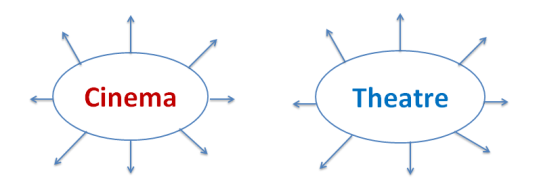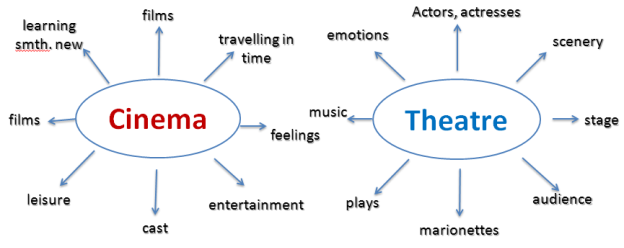Урок "Cinema and Theatre in our Life"
Date:
The Theme: The World of Cinema and Theatre
The Subject of the Lesson: Cinema and Theatre in our Life
Objectives: Students will be able to:
- Use the words on the topic;
- to understand the gist and details of the text for listening;
- to stimulate students’ creative thinking and imagination;
- to develop students’ listening, reading and speaking skills;
- to encourage pupils to work in groups and pairs.
Visual Aids: a book, a workbook A. Nesvit “English 7”, various texts, cards on the topic, notebook, multimedia projector, presentation.
Procedure of the Lesson
I. Warming up
T.: - Good morning, children! It’s nice to see you.
P.: - Good morning, teacher! It’s nice to see you too.
T.: - How are you today?
P.: - We are fine, thank you.
T.: - Take the seats. Let’s start our lesson.
Answer the questions:
- What day is it today?
- What is the weather like today?
- What season is coming?
- Do you like Spring?
- Today we are going to talk about cinema and theatre. Cinema and TV films have become an important part in our life. Some of us like going to the theatre too. The motto of today’s lesson is: «The world is a stage and people are merely actors» (William Shakespeare).
Can you comment on this quotation?
(From my point of view, the world of cinema and theatre lets us look at ourselves and become better).
II. Checking of H/A
Let’s check up your hometask. You’ve prepared projects about your favourite actors, actresses, films,theatres. Give some information about them. (students’ answers).
III. Presentation (book closed)
3.1. Complete these Mind-Maps

Look! Did your opinions coincide with mine? OK. To my mind we think the same.

3.2. “Listen and Guess the Word”
What kinds of films do you like to watch?
- A kind of film telling about the life of cowboys in America. (a western)
- A film that is funny or has a happy ending. (a comedy)
- A kind of film about dangerous and exciting situations. (an adventure film)
- A kind of film telling about some military events. (a war film)
- A person who comes to the cinema to watch some film. (a viewer)
- A set of events in any story or a play. (a plot)
- A film using drawing and not real people or animals. (a cartoon)
- A film about life in the future, often describing space travel and life on other planets. (a science fiction film)
- A place in the theatre where actors and actresses perform the plays. (a stage)
- A theatrical performance where actors express their feelings with the help of dance. (a ballet)
- A performance in which the actors sing instead of speaking. (an opera)
- A person who comes to the theatre to see a performance. (a spectator)
- A place in the theatre where you can buy tickets for the performance. (a ticket booth / a ticket box office)
3.3. Make up a table.
|
positive |
negative |
|
|
|
-What are positive and negative sides of watching films?
favourite, terrible, exciting, amazing, boring, funny, sad, relaxing, depressing, interesting, frightened, amusing, useful, horrible, good, romantic, unusual, kind, bad, violence, finding out a new facts, dependence on TV, entertainment, waste of time, new emotions.
IV. Presentation (book opened)
4.1. Read the text
Broadway theatre, commonly called simply Broadway, is theatrical performances presented in one of the 40 professional theatres with 500 or more seats located in the Theater District and Lincoln Center along Broadway, in the Manhattan borough of New York City. Along with London's West End theatres, Broadway theatres are widely considered to represent the highest level of commercial theatre in the English-speaking world.
- The Broadway Theater District is a popular tourist attraction in New York City. According to The Broadway League, Broadway shows sold approximately $1.193 billion worth of tickets in calendar year 2013, compared with $1.158 billion for 2012. Attendance in 2013 stood at 11.58 million, down from 12.16 in 2012.
- The history of theatre charts the development of theatre over the past 2,500 years. While performative elements are present in every society, it is customary to acknowledge a distinction between theatre as an art formand entertainment and theatrical or performative elements in other activities. The history of theatre is primarily concerned with the origin and subsequent development of the theatre as an autonomous activity. Since classical Athens in the 6th century BCE, vibrant traditions of theatre have flourished in cultures across the world.
- The history of film began in the 1890s, with the invention of the first motion-picture cameras and the establishment of the first film production companies and cinemas.
- Remind me what is passive voice? Active constructions are used more often in English than passive constructions. Generally, you need the passive voice in the following cases: Case 1: When it is not known or not necessary to mention who performs the action. Cotton is grown in Egypt. Case 2: When it is necessary to draw more attention to the receiver of the action. In this case, the object in the active construction becomes the subject in the passive construction and receives more attention. A phrase with the preposition "by" is used if it is necessary to show by whom the action is performed. Several houses were destroyed by the hurricane last week. Now give me your own examples.
4.2. There is a text, called “Theatre and Cinema: How it all began”. Read it and be ready to answer the questions:
- In what country was theatre born?
- Why do we have to remember Thespis?
- When was cinema born?
- What country produced the first dramatic film?
- Why film “Jazz Singer” is important for the history of cinematography?
4.3. Work in groups.
- Now I want you to divide into 2 groups, let’s make a discussion. The first group is going to show us disadvantages of cinema and the second group has to talk about its advantages. If task is clear, you may start.
- it is enough, now let’s talk about theatre. The first group takes its advantages and the second group takes its disadvantages. Please use only facts.
4.4. Today we want to show you a small fragment from the fairytale ‘Little Red Riding Hood’.
Let’s give an opportunity to our artists show their talents.
SCENE 1
(Grandson plays in the room. Grandmother comes in.)
Grandmother: Dan, what are you doing? It’s late! Why don’t you go to bed?
Dan: Oh, Granny, tell me a tale, please.
Granny: No, no. You should go to bed.
Dan: My dear Granny, please, just one...
Granny: Well, OK, but only one. I hope you’ll enjoy it.
SCENE 2
(Red Riding Hood makes bubbles.)
R.R.H.: Hello, everybody! I’m Mary but my nickname is Red Riding Hood because of my Red Hood. My Granny made it for my last birthday.
(Mother comes in. Red Riding Hood is beading.)
Mother: Red Riding Hood! Where are you?
R.R.H.: I’m here, Mummy. What’s the matter?
Mother: What are you doing?
R.R.H.: I’m beading.
Mother: Don’t you know that today is your Granny’s birthday?
R.R.H.: Of course, I remember it. I’m making a pre-sent for her. Look! Do you like it?
Mother: It’s great! I like it very much!
R.R.H.: Do you have a present for Granny?
Mother: Yes, I do. But you’ll see it later. When you finish, take this basket with buns, bananas, oranges, juice and honey to your Granny.
R.R.H.: All right, Mummy.
Mother: Red Riding Hood! Be very careful! Don’t stop in the wood! The main thing is don’t speak to anybody on the way, especially to Big Bad Wolf.
R.R.H.: OK, Mummy. Don’t worry. Goodbye.
Mother: Bye-bye.
SCENE 3
(In the wood. Red Riding Hood is picking up flowers.)
R.R.H.: Oh, how nice it is here! The sun is shining. The sky is blue. The birds are singing. The bee; are buzzing. Oh, I love summer so much!
Here’s the beehive. Where are the bees? Hidden away where nobody sees. Look at them! One, two, three.
(Bees fly in turn.)
R.R.H.: Three busy bees on a lovely spring day. This one says...
Bee 1: Let’s fly away!
R.R.H.: This one says...
Bee 2: And we’ll make some honey!
R.R.H.: This one says...
Bee 3: A good thing that it’s warm and sunny!
R.R.H.: So the busy bees went flying along Singing and dancing a happy honeybee song.
(Bees are dancing. Rabbit appears.)
Rabbit: One little honeybee by my nose flew. Soon came another — then there were two.
Two happy honeybees in the apple tree/ One more bee came buzzing up then there were three.
Bee 1: Buzz! Goes the bee hour after hour. Buzz! Goes the bee From flower to flower.
Bee 2: Sucking out the nectar flying home. Storing up the nectar In the honey comb.
Bee 3: Buzz! Goes the bee making honey so sweet. Bee makes the honey that you love to eat.
(Bees fly away.)
Rabbit: Oh, R.R.H.! I’m very glad to see you!
R.R.H.: So am I.
Rabbit: Where are you going all alone in the wood? Are you carrying your tasty buns somewhere?
They smell delicious. I could smell them a mile from here.
R.R.H.: I’m going to my Granny. She has a birthday today. Let’s go with me.
Rabbit: OK. I ’m very glad for your invitation. I think your Granny we’ll be happy to see us.
V. Practice:
a) controlled
Match the words (1-6) with their definitions (a-f).
|
1. An opera |
a) a building where films are demonstrated on a large screen |
|
2. A theatre |
b) a performance in the theatre, where the words are sung to the music |
|
3. A ballet |
c) a performance about daily life and humorous life situations |
|
4. A comedy |
d) a play for the theatre, radio, or TV |
|
5. A cinema |
e) a performance where a group of dancers tell the spectators a story |
|
6. A drama |
f) a special building where the performance are held |
b) guided
Complete the dialogue with the phrases (1-6) from the box.

A: What film have you seen recently?
B: ________________________________________________________________________________
A: Who is the director of the film?
B: ________________________________________________________________________________
A: Who stars in the film?
B: ________________________________________________________________________________
A: Who is the author of the book the film is based on?
B: ________________________________________________________________________________
A: Had you read the book before you watched the film?
B: ________________________________________________________________________________
A: Would you like to watch a new film about Harry Poter?
B: ________________________________________________________________________________
VI. Evaluation
What was our lesson about?
What activities did you like best of all?
What must we do in order to be good lovers of art?
VII. Setting a Home Assignment
Thanks for your excellent work during the whole lesson. Open your daybooks and write down your homework.
Your homework for the next time is Learn new words and retell the text, Exercise 3 ( a, b) page 110.


про публікацію авторської розробки
Додати розробку
